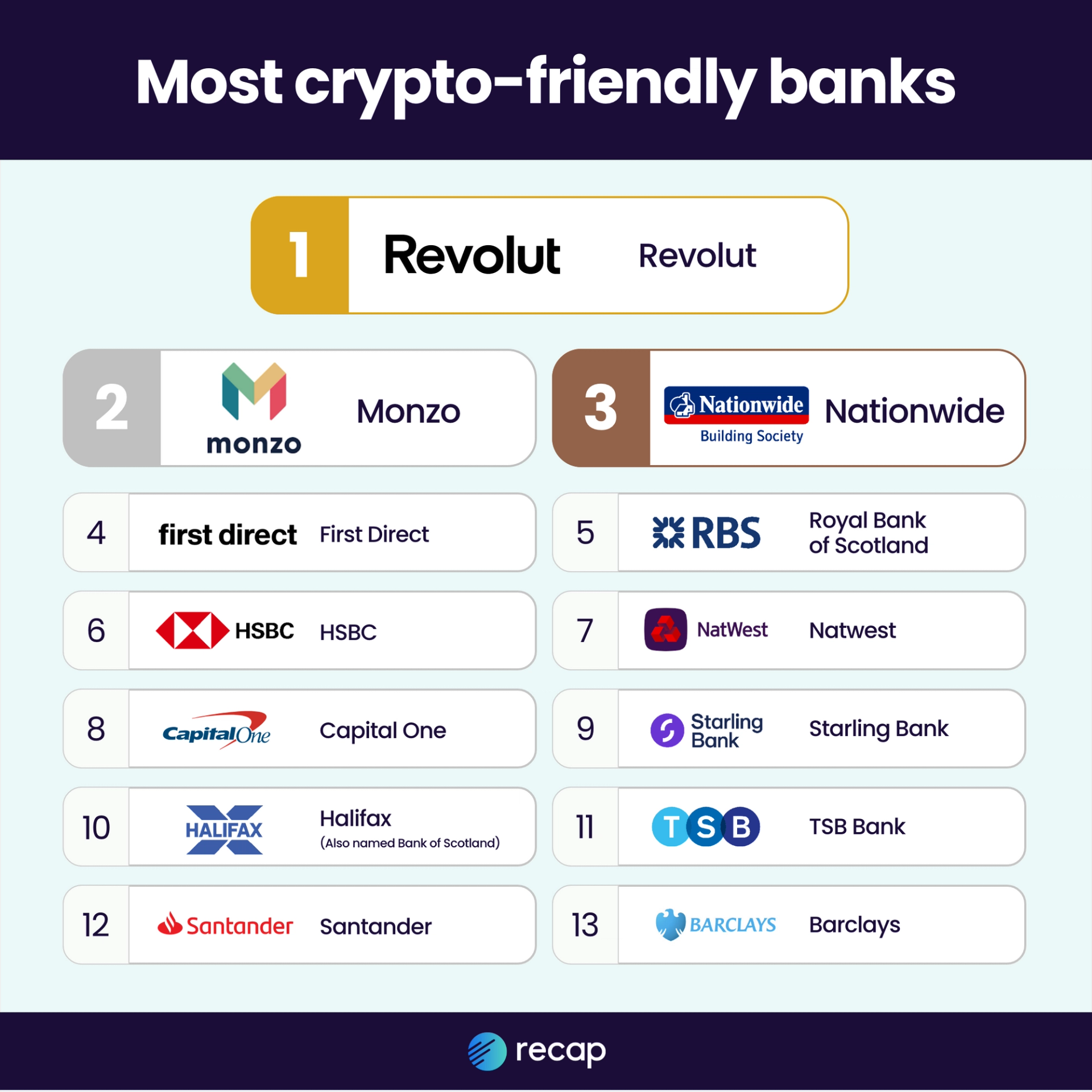

Banks have adopted an extremely risk-averse approach and attitude to crypto in recent years. They’re cracking down on how they allow customers to handle cryptocurrency in a bid to reduce risk - including placing restrictions on outgoing and incoming transactions.
Since the collapse of FTX, one of the biggest crypto trading venues, many banks have taken extra precautions to protect their customers. And some have also restricted card payments to another exchange, Binance, after the UK’s Financial Conduct Authority (FCA) warned that Binance was not allowed to conduct any regulated activity in the country.
But with many crypto exchanges now FCA-regulated, making necessary recommended changes, why is there still such a big pushback from the majority of banks? There are nowhere near as many restrictions around gambling.
Cryptocurrency is often seen as an avenue for financial freedom, but when your money is deposited into a bank - the bank owns it.
This poses the question - is it truly financial freedom if banks are able to dictate what people can and can’t do with their money?
It’s not just crypto restrictions that have put banks in the spotlight. Many financial institutions have begun incorporating tighter restrictions on other aspects of their policies over the last year.
In 2023, Nigel Farage’s Coutts bank account was closed, due to his views being “at odds with their position as an inclusive organisation.” Many people noted that, regardless of public perception towards Farage, there have been concerns around a limit on freedom of speech, and again, the possibility of banks having too much control compared to the account holder.
Recently, it was revealed that the FCA is seeking data on the number of customers who have experienced account denials and terminations in connection with their crypto assets. There’s also a new travel rule in which customers must provide information on the collection, verification, and sharing of important information pertaining to crypto asset transfers.
With so many new regulations coming into place, financial freedom of those investing in crypto is only going to keep coming into question. With the government sharing its plans to advance London into being a major crypto hub, the reality is a stark difference - with both investors and crypto companies facing problem after problem with banks.
As the UK continues to move to a cashless society, are we at the mercy of banks overreaching further into our lives, and choosing to dictate what is a risk? While embracing crypto does bring risk, any innovation does.
What do crypto-users think?
To understand how much of an impact banking has on the crypto community, Recap issued a poll across Reddit, Twitter and LinkedIn to identify the public’s feelings about the regulation changes at banks.
We asked crypto investors: Have you switched banks due to difficulties investing in crypto?
Overall, the results found that 38% of investors have changed banks due to cryptocurrency policies. Of the remaining respondents, 22% have also strongly considered it. One respondent claimed to have their entire bank account blocked, including all cards and mobile banking facilities, because of a large amount of money that came in through cryptocurrency - others switched exchanges to ones more supported by banks. According to the Financial Times, almost 1 in 10 people own cryptocurrencies - which has doubled in the last year, meaning that cryptocurrency policies of banks will become ever more prevalent for consumers and investors alike - not to mention businesses.
For many digital asset users, what control do they have over their own accounts and crypto holdings?
To find out, Recap created the crypto-friendly banks index. We looked at 13 of the biggest banks across the UK and analysed 12 different data points.
This includes:
- Can you trade through an online or mobile banking platform?
- Can you trade through eToro?
- Does it have a full cryptocurrency policy on its website?
- Total limit of debit card payment to exchanges.
- Total limit over 30-day period to exchanges.
- Can you purchase cryptocurrency directly on a credit card?
- If they have any extra crypto offerings, including a specific crypto card.
- Do they have policies that forbid customers from using regulated cryptocurrency exchanges?
- Are they protected under the Financial Services Compensation Scheme?
- Number of new complaints (banking and credit) to the Financial Ombudsman in 2nd half of 2022.
- Number of new complaints (investments) to the Financial Ombudsman in 2nd half of 2022.
Each bank was given a score, to reveal which financial institution is ideal for crypto customers.
What makes a crypto friendly bank?
A crypto-friendly bank is one that places limited or almost no restrictions on interactions with cryptocurrency exchanges. You will be allowed to do some or the following:
- Allow customers to transfer money to centralised cryptocurrency exchanges.
- Allow customers to buy, sell and hold digital assets directly.
- Have a wider limit on how much you can withdraw and deposit in your account.
- Allow users to purchase cryptocurrency using a debit or credit card.
The most crypto-friendly banks in the UK
Fintech bank Revolut has been named as the best bank for crypto holders in the UK, having the highest impact score in Recap’s research. Not only do users benefit from a seemingly unlimited exchange limit, but the global neobank is also the only one that permits users to trade through mobile banking apps. Revolut customers also benefit from a ‘Crypto Learn and Earn’ scheme. The in-app education tool allows customers to earn crypto rewards in return for completing lessons, as the bank appears to be seen as a leader in attempting to destigmatise crypto. Monzo came a close second, offering a number of similar features to Revolut. However, Monzo differs as it doesn’t allow crypto users to trade through online or mobile banking platforms and there is a risk of transactions being blocked from time to time to minimise the chance of fraud. When it comes to customer complaints to the Financial Ombudsman, Monzo received the fewest for banking and investments in the last half of 2022. Monzo, First Direct, Capital One and Starling Bank all had zero complaints relating to investments to the Financial Ombudsman.

The majority of banks have strict crypto limits and restrictions
Our data revealed that the majority of banks tend to be stricter with what they allow when it comes to crypto. Of the 13 banks, three didn’t have any cryptocurrency policy at all on their website, which could cause confusion or misunderstanding from its customers. And just one (Revolut) had any specific crypto offering, whereas five banks didn’t seem to have any maximum limit specified on debit card payments to exchanges - either daily or monthly. For example, Natwest and HSBC recently changed both of their policies to restrict cardholders from purchasing or receiving transfers from crypto exchanges or merchants. The exchange limits are a lot lower with the minimum spend being £1,000 at Natwest and £2,500 at HSBC with a maximum 30-day limit of up to £5,000 and £10,000. Interestingly, First Direct has recently changed its crypto policies by putting limits in place. Customers now have a total payment limit of £10,000 in any rolling 30-day period. Some banks such as Barclays and Santander have stricter restrictions on mobile platforms, with policies in place to forbid customers from using regulated exchanges. Santander even claims to have future plans to introduce a block on all real-time payments to cryptocurrency exchanges made via telephone banking and in-branch payments, as well as online and mobile banking. In the last year, Barclays has received over 3,600 complaints to its banking and credit sector from customers - the largest number out of all banks.
How might this impact the UK’s crypto ambitions?
With the Prime Minister’s plans to create a blockchain future for Britain, and with London being revealed as the most crypto-ready city in the world in 2023, according to our research, financial institutions need to be able to encourage investment and innovation to support the government’s plans. One of the reasons for this is likely to do with compliance costs, and after doing a cost benefit analysis, some banks may think it’s not worth investing in the risk to attract customers. But, that could end up being extremely detrimental to banks long-term.
Are legacy banks going to struggle to retain their customers and end up having a hollowed customer base of older generations? As younger people explore new ways to invest, it’s highly likely that they’ll move to neo banks and fintechs that allow them to have autonomy and feel more financially free, while still protecting them. Banks need to remain innovative, while catering to the whole population. Clarity and support for customers are essential for people to make informed investment decisions, and while banks are cracking down on crypto, the UK still has a way to go in implementing robust crypto tax policies. Cryptocurrency is not directly competing with banks - but it is a massive disruptive force for them, and to figure out what they’re going to do with it. Of course, crypto does present a number of unique challenges, but strong leaders stand out by embracing change - not fighting it. We urge the government to make sure there is an equal opportunity for everyone who wants to invest in whichever way they choose, especially as we move into a crypto-ready Britain.
Industry thoughts
Su Carpenter, director of operations at CryptoUK, commented on the report:
“CryptoUK, alongside The Payments Association wrote again to Andrew Griffiths in August 2023 raising the joint concerns of our members around the lack of basic banking facilities and the de-banking of crypto and digital asset organisation in the UK, following earlier letters to both the EST and the Regulators in March of this year but we have yet to see any direct action being taken by the Government to intervene in these issues.
The risk averse approach being taken by UK banks to both the banking of crypto firms and the blanket bans on transactions from account holders to crypto exchanges totally goes against the Government’s well publicised ambitions for the UK to become a global crypto hub.

“The risk averse approach being taken by UK banks to both the banking of crypto firms and the blanket bans on transactions from account holders to crypto exchanges totally goes against the Government’s well publicised ambitions for the UK to become a global crypto hub.
“By limiting access to the basics required to operate a legitimate business in the UK, not only limited to banking but other professional services such as insurance, businesses are being forced down the route of using overseas payments service providers and third party organisations to operate their businesses.
“This is not a situation replicated across other jurisdictions and places the UK in an uncompetitive position when it comes to organisations choosing the UK to domicile their operations. Not only does this reduce the opportunities for talent development and job creation here in the UK, but also loses the UK economy significant amounts of potential tax revenue.
“The Government to date has put the onus back onto the banks and crypto industry to find a solution to this issue, but this has not yet led to any fruitful engagement with the banking sector, or any indication of a willingness to address these issues. We strongly believe this has to be led by the Government and this will be the only way to enforce change and realise the UK’s ambitions for the future of the UK crypto and digital assets economy.”
How might this impact tax?
For investors who need to pay capital gains tax on their crypto returns, if their bank doesn’t easily facilitate the deposit and withdrawal of crypto funds, it could even have an impact on their tax if they’re trying to be compliant but struggling to access their bank account to pay their crypto tax.
The government needs to make sure that there’s a level playing field for all people investing in crypto. CryptoUK states that the “Government in the past have put the onus back on us/UK finance to bring our members together to find solutions, but there is little to no appetite from the banks to engage.”
To help crypto tax software and a crypto tax calculator can help with compliance; these are tools that help individuals and businesses calculate and file their taxes on cryptocurrency transactions.
Methodology
Our researchers compiled all the banks in the UK and looked at its policies on these factors to create an index out of a score of 6100:
- Can you trade through an online or mobile banking platforms?
- Can you trade through eToro?
- Does it have a full cryptocurrency policy on website?
- Total limit of debit card payment to exchanges.
- Total limit over 30-day period to exchanges.
- Can you purchase cryptocurrency directly on a credit card?
- If they have any extra crypto offerings, including a specific crypto card.
- Do they have policies that forbid customers from using regulated cryptocurrency exchanges?
- Are they protected under the Financial Services Compensation Scheme?
- Number of new complaints (banking and credit) to the Financial Ombudsman in 2nd half of 2022
- Number of new complaints (investments) to the Financial Ombudsman in 2nd half of 2022

Data correct as of September 2023.



